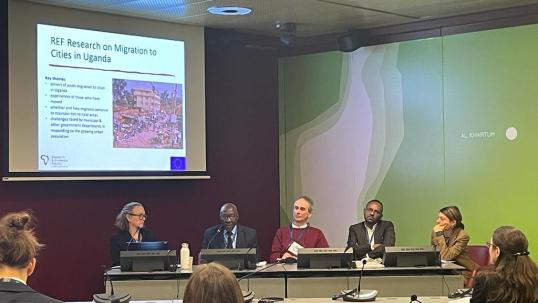
From 2016 - 2024, the Research and Evidence Facility (REF), has been a driving force in shedding light on the complex dynamics of migration, displacement, and mobility in the greater Horn of Africa.
Funded by the European Union’s Emergency Trust Fund for Africa (EUTF), REF has produced over 60 studies and 72 blogs that contribute to our understanding of the region’s challenges and opportunities in the field of human mobility.
Key Achievements of the REF
Since its inception, REF has conducted extensive research across 8 countries in the Horn of Africa, building regional capacities, involving a network of over 70 researchers to foster cooperation within the academic community across the region.
The REF has engaged with a diverse range of stakeholders, including EU delegations, donors, UN agencies, NGOs, government bodies, civil society, and the Intergovernmental Authority on Development (IGAD). Through these collaborations, REF generated actionable recommendations for addressing human mobility challenges.
The REF launched its legacy platform during the INTPA InfoPoint last July 2023. This platform serves as a hub for accessing valuable insights into migration and displacement issues. The multi-content website encapsulates years of rigorous research, offering a comprehensive overview of findings and recommendations as well as the full library with research studies.
Climate, Livelihoods, Conflict – entry points to discover the major findings of the REF
REF's findings, conveniently summarized on the legacy platform, emphasize three pivotal themes: climate, livelihoods, and conflict. The research highlights the role of mobility in enhancing people's livelihoods, contributing to essential developmental processes.
Explore the findings here or the web interface using your mobile device & scanning the QR below.
Sharing Insights Globally: 14th Global Forum on Migration and Development
The REF participated in the 14th Global Forum on Migration and Development (GFMD) on 23-25 January 2024, in Geneva. The event, held under the French presidency, attracted over 1300 participants and was articulated around the increasingly prominent topic of climate and human mobility. The forum provided a genuine platform to disseminate key lessons learned within the main thematic areas covered by the REF.
Towards Mobility-Sensitive Legal and Policy Frameworks
At the GFMD summit, the European Commission, Directorate General International Partnerships (DG INTPA), sponsored a panel discussion to explore the implications of the REF research findings, especially in borderlands and urban centres. In this panel, the REF proposed an evidence-based narrative on mobility, as a key component of livelihoods and resilience in the Horn of Africa, highlighting the need for more nuanced approaches in policy making on migration.
Discover the latest research from the Research & Evidence Facility
Below, we curated for you some recent key publications according to the major themes explored by the REF:
- Conflict: South Sudan’s decades of displacement: Understanding return and questioning reintegration
- Livelihoods: Operationalising a whole-of-society approach
- Climate: Closing the environment-migration gap in climate policy and programmes in Kenya & Bridging the gap: environmental change, mobility and policy in Ethiopia’s Somali Region and Somaliland
Explore all Publications – Research and Evidence Facility: Migration in the Horn of Africa (soas.ac.uk)
Details
- Publication date
- 14 February 2024
- Author
- Directorate-General for International Partnerships
- Region and Country
- REGIONAL
- Horn of Africa


